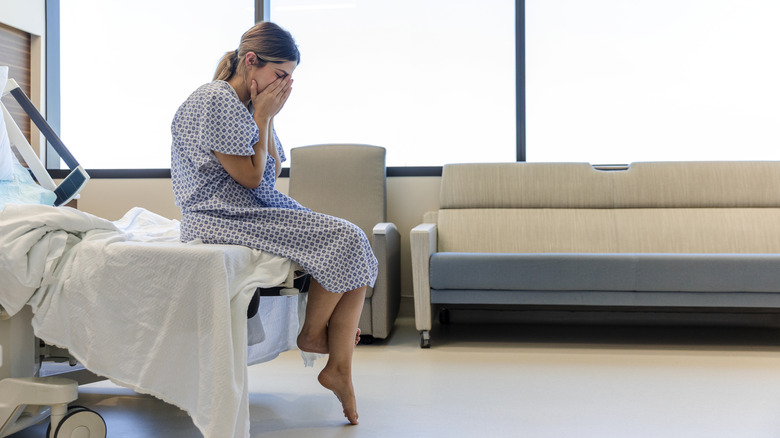Here's When You're At Highest Risk Of Miscarriage
Having a miscarriage is a devastating experience, and it can leave a mother struggling with profound grief. Unfortunately, miscarriages happen often, and they occur in about 10% to 20% of pregnancies, as reported by Planned Parenthood.
There are different types of miscarriage, including complete miscarriage, incomplete miscarriage, and missed miscarriage. A complete miscarriage releases all of the pregnancy tissue naturally, whereas an incomplete miscarriage may need treatment to remove the remaining tissue. Missed miscarriages occur when an embryo is absent from the pregnancy sac or is no longer alive when an ultrasound is performed. An early form of miscarriage that occurs during the first five weeks of pregnancy is referred to as a chemical pregnancy, according to Tommy's.
Some women who are experiencing a miscarriage may notice bleeding or spotting, cramping, abdominal pain, fever, and a feeling of not being pregnant anymore, as explained by March of Dimes. Dr. Rebecca Cohen, obstetrician-gynecologist from The American College of Obstetricians and Gynecologists, noted that it can sometimes take two weeks or more for pregnancy tissue to pass from the body completely, and medications or a D&C procedure speed up the process.
Recognizing the symptoms of miscarriage isn't always easy, as they can mimic many normal symptoms of early pregnancy. Miscarriages are more likely to occur during the first 20 weeks of pregnancy, so it's important for pregnant women to keep track of any symptoms they experience and maintain regular contact with their doctor during this time.
When most miscarriages occur
Early in pregnancy appears to be the most vulnerable time for miscarriage risk. Miscarriage occurs within the first 12 weeks of pregnancy for most women who have experienced one, as reported by NHS Inform. It's even possible for some women to miscarry before finding out that they're pregnant. Women can also experience miscarriages later in their pregnancy, although this is less common.
Every case of miscarriage is different. Some miscarriages are associated with illnesses like diabetes, and others are due to chromosomal abnormalities in the fertilized egg. Having problems with the thyroid, uterus, cervix, or hormones can increase the risk of a miscarriage, as reported by the Mayo Clinic. Miscarriages may be more likely to affect some women who have polycystic ovary syndrome (PCOS) or low progesterone levels, according to the March of Dimes. Those who have had more than two consecutive miscarriages may be at an increased risk of another one.
Miscarriages are more likely to occur in women over 35, as the risk increases with age. The chance of a miscarriage is 20% at 35 and rises to 80% at 45, according to Mayo Clinic. Women exposed to solvents, lead, and other toxic chemicals may also be at an increased risk. Miscarriages can sometimes occur as a result of drinking alcohol, smoking, or drug use.
No matter the reason for a miscarriage, it's important to remember that having one doesn't mean that it was your fault, and there's no reason to blame yourself.
Can you decrease the risk of a miscarriage?
Miscarriages are not preventable in many cases, as noted by Parents. Nevertheless, practicing a healthy lifestyle may decrease the likelihood of miscarriage for some women. You should avoid recreational drug use and alcohol intake while you're pregnant. It's also wise to reduce caffeine intake to a maximum of two 6-ounce cups per day. If you have any chronic health conditions, such as hypothyroidism or autoimmune diseases, Dr. Stephanie Zobel told Parents that these should be effectively managed before becoming pregnant.
One 2021 study published in the Annals of Internal Medicine found some evidence to suggest that taking low-dose aspirin before conception may decrease the risk of miscarriage in some women who have had one or two miscarriages. However, this option should be discussed with your doctor, since taking low-dose aspirin may not be safe for everyone. According to Insider, it may be possible to lower miscarriage risk by eating healthy, exercising, and being at a healthy weight before and during pregnancy.
If you've had a miscarriage, it's normal to feel a wide range of emotions as you work on healing from your loss. As pointed out by NCT, it's important to not judge yourself for how you feel and to reach out for support when you need it. A grieving mother may experience sadness, guilt, anger at the world, jealousy toward other mothers, or even numbness. Grief counseling and miscarriage support groups are available options for women who have lost their babies.



